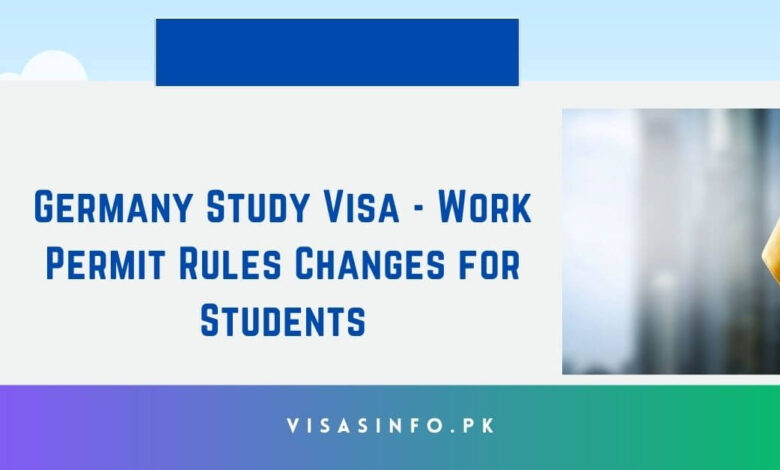Germany Study Visa – Work Permit Rules Changes for Students

Germany offers a variety of opportunities for international students, such as tuition-free education and flexible work permits. This guide will assist you in optimizing your academic experience in Germany by furnishing critical information regarding the requirements for study visas, the legal framework for part-time employment, and the available post-study employment opportunities.
Deutschland has become an increasingly popular destination for international students as a result of recent substantial changes to its work permit and study visa policies. These new regulations are intended to attract a greater number of international students and facilitate the process of finding employment after completing their studies.
It is crucial to be aware of these developments, regardless of whether you are a current or prospective student, as they could significantly affect your academic and professional aspirations in Germany. This article will address the primary modifications and their repercussions.
Growing Enrollment and Programs Taught in English
The rate at which international students are residing in Germany is increasing. Recent data from the German Academic Exchange Service (DAAD) indicates that over 400,000 foreign students are currently enrolled in German universities.
This development is significantly influenced by the availability of over 1,500 English-taught programs. These initiatives foster cultural diversity in academic institutions and provide access to higher education in Germany for non-German speakers.
Free Education
One of Germany’s most appealing features is the fact that public institutions in certain states provide tuition-free education to international students. This program has provided foreign students seeking a high-quality education in Germany with a readily available and affordable option. Germany is a favored destination for international students due to its affordable tuition and exceptional educational system.
Comprehending the German Study Visa
International students usually need a “D” or National Visa, specifically a Study Visa (Studienvisum), to study in Germany for longer than ninety days. Students can continue their education at an accredited German university with this visa.
Important Conditions for Obtaining a Study Visa to Germany:
- Acquire a place at a university or other higher education institution to be admitted to a German university.
- Proof of financial assets: Demonstrate that you have sufficient funds to cover your living expenses during your time as a student. Typically, an account that has been blocked indicates this.
- Health insurance: Provide evidence of comprehensive health insurance coverage.
- Language proficiency: The course may necessitate the verification of German language proficiency, typically at the B1 level.
Check Also: Simple Steps to Secure a Schengen Visa – Complete Guide
Work Permits for Students in Other Countries
The Werkstudenten Visa: Germany’s “Werkstudenten” visa category allows foreign students to work part-time while enrolling in classes. This visa provides students with the opportunity to increase their income and gain practical experience.
Important information for working as a Werkstudent
- Students are permitted to work a maximum of 140 full days or 280 half days per year.
- Compliance: It is crucial to adhere to the work-hour limitations. Overworking may result in the revocation of a visa, which is a severe consequence.
- Make your academic pursuits a priority: While it is permissible to work part-time, your academic pursuits should always be prioritized.
Benefits of Germany Study Visa
- World-Class Education: Germany is home to some of the world’s most prestigious universities, which provide high-quality education, particularly in the fields of engineering, sciences, and humanities. A degree from a German institution is highly regarded on a global scale.
- Low or No Tuition Fees: Numerous public universities in Germany impose minimal to no tuition fees on international students, rendering it an affordable alternative for higher education.
- Working While Studying: Students who are in possession of a German study visa are permitted to work part-time, typically for a maximum of 120 full days or 240 half days per year, in order to provide for their financial needs.
- Post-Study Employment Opportunities: Upon completion of your studies, you are permitted to extend your stay in Germany for a maximum of 18 months in order to pursue employment opportunities that are pertinent to your field of study. Upon obtaining employment, you may submit an application for an EU Blue Card or work visa.
- Pathway to Permanent Residency: Permanent residency may be achieved through employment in Germany following graduation, particularly if one maintains a stable position and fulfills additional criteria.
- Schengen Area Access: A German study visa enables you to travel freely within the 26 Schengen Area countries, facilitating your exploration of Europe during your study breaks.
- Cultural Experience: Studying in Germany provides the chance to become immersed in a diverse cultural heritage, acquire the German language, and engage with individuals from a variety of backgrounds.
- High Quality of Life: Germany is renowned for its exceptional public infrastructure, healthcare, safety, and high standard of living, all of which contribute to a positive student experience.
- Support Services for International Students: Numerous universities provide support services for international students, such as academic counseling, language courses, and integration programs, to assist them in adjusting to life in Germany.
- Innovation and Research Opportunities: Germany is a leader in research and innovation, offering students the opportunity to collaborate with industry leaders, access state-of-the-art facilities, and participate in cutting-edge research initiatives.
Post-Study Work Options
The Work Seeker Visa: Germany also offers foreign graduates the opportunity to remain and seek employment. Graduates are permitted to remain in Germany for a maximum of 18 months to pursue employment opportunities within their respective fields of study with the Job Seeker Visa.
Principal Advantages of the Worker Visa:
- Job search time: Graduates will have no difficulty securing employment.
- Route to becoming a resident: The EU Blue Card or a long-term residency permit may be applied for after employment.
Crucial Things to Take Into Account for International Students
- Conduct a comprehensive investigation: Identify the specific visa restrictions and work permits that are relevant to your country and the academic program you have chosen.
- Arrange in advance: Begin the visa application process promptly to avoid any potential delays.
- Seek guidance: Utilize support services and resources, including the German consulate or embassy, foreign offices at universities, and student advising services.
- By meticulously evaluating these factors and adhering to German immigration regulations, international students can optimize their opportunities to study, work, and potentially establish a career in Germany.
Conclusion
Germany is a preferred destination for international students due to its abundance of employment opportunities, affordable tuition, and exceptional educational institutions. Students can optimize their educational and professional prospects in Germany by comprehending the prerequisites for work permits and study visas.
Recent modifications to immigration laws, particularly those concerning visas and residence permits for job seekers, have simplified the process of entering and working in Germany. These modifications contribute to the nation’s economic objectives and offer international students a pathway to lucrative careers in one of the world’s most prosperous economies.
Frequently Asked Questions:
What is the new law in Germany for international students?
The new skilled worker law was effective in March 2023, enabling foreign students to work during their studies in Germany. International students can come to Germany within 9 months of starting their studies and work up to 20 hours per week.
Can I work more than 40 hours in Germany as a student?
For EU nationals, the limit is 20 hours per week during term times. During your semester break, you can work up to 40 hours a week. You can only work 120 full days or 240 half days every year, whether during term or vacations, if you are coming from outside the EU.
Can international students get a work permit in Germany?
International students also have the opportunity to work in addition to studying. The Federal Employment Agency (BA) does not require approval for students from third countries to work up to 140 full days or 280 half-days per year.



